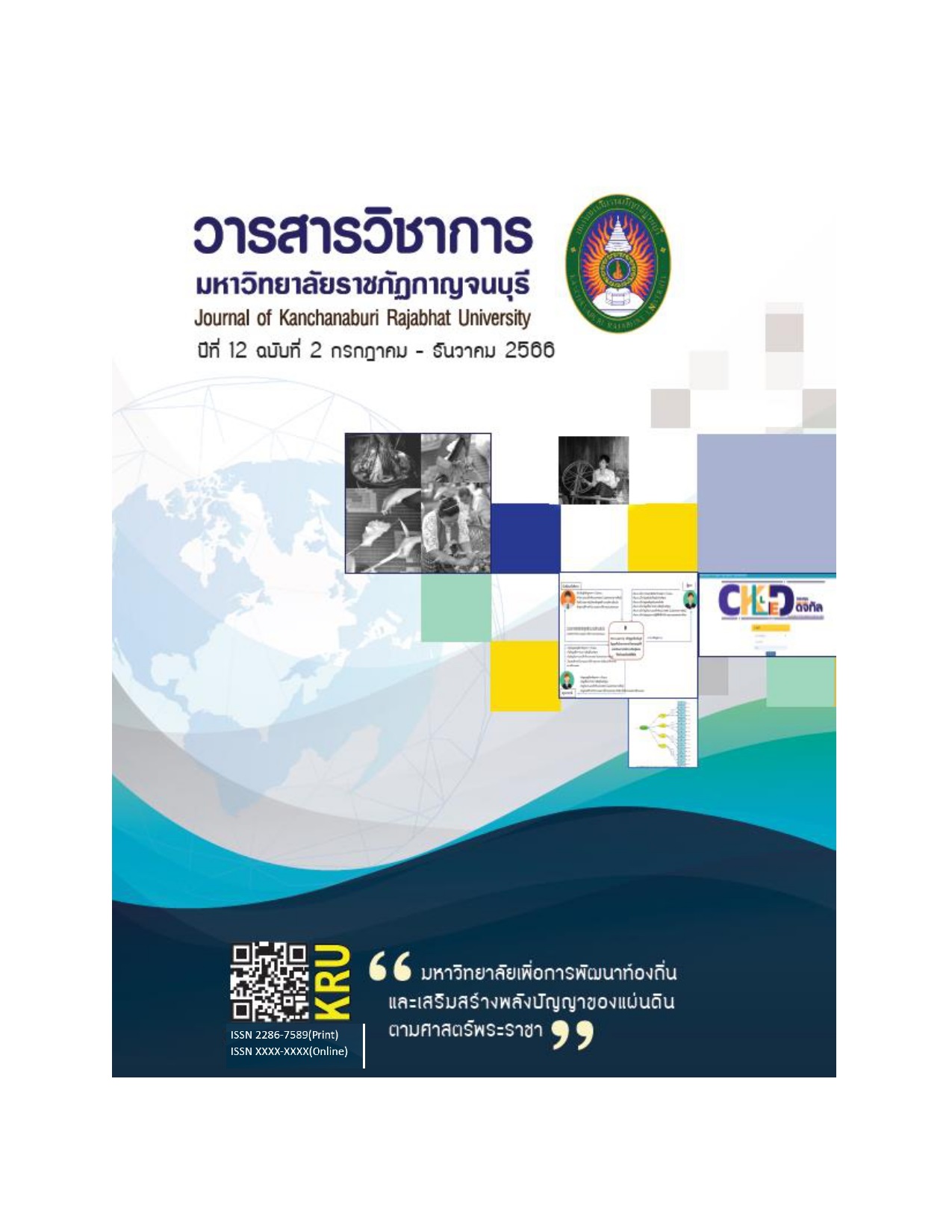การพัฒนาระบบอีเลิร์นนิงหลักสูตรท้องถิ่นภูมิปัญญาพื้นบ้านภาคกลางโดยประยุกต์ ใช้ศาสตร์พระราชาเพื่อการเรียนรู้ตลอดชีวิตด้วยเทคโนโลยีดิจิทัล THE DEVELOPMENT AN E-LEARNING SYSTEM, LOCAL CURRICULA, FOLK WISDOM, CENTRAL REGION BY APPLYING THE KING'S SCIENCE FOR LIFELONG LEARNING WITH DIGITAL TECHNOLOGY
Main Article Content
Abstract
The purpose of this research were 1) to develop an e-learning system, local curriculum, local wisdom in the central region by applying the King's science for life-long learning with digital technology. 2) to assess the efficiency and satisfaction of the e-learning system for the central local wisdom curriculum by applying the king's wisdom for life-long learning with digital technology. The system is used for curriculum management covering 9 provinces in the central region, including 30 curriculums for grades 1 - 6, both at the level of basic education, non-formal and informal education in the central region, there are 10,000 students including teachers participating in the project, with a sample of 370 people. Tools used in system development using HTML, PHP and java script, Editplus and Adobe Dreamweaver programs, MySQL databases based on relational database design principles. Tools used to collect information Evaluation of system performance using Back Box Testing method of software testing and user satisfaction of the system. The instrument used was a questionnaire according to the Rating Scale of 5 levels, all scores were used to calculate the mean. and standard deviation.
The results of the research were as follows: 1) The developed e-learning system can work in accordance with the requirements according to the working conditions of the system set forth in the Central Local Wisdom Curriculum Development Project by applying the royal science for lifelong learning with the system digital technology. User groups are divided into 3 groups, consisting of administrators, teachers or professors, and students. System applications allow the Internet to be run through a web browser program such as Google Chrome, Mozilla firefox, can be used through various devices such as computers, mobile phones, etc, can access the learning system in the system. Every place and every time. 2 )System performance evaluation results by experts The average score was 4.82 and the standard deviation was 0.24. It was found that the system was most efficient. and satisfaction assessment results from system users, the mean score was 4.18, the standard deviation was 0.80, the satisfaction was at a high level. according to the
assumptions set.
Article Details

This work is licensed under a Creative Commons Attribution-NonCommercial-NoDerivatives 4.0 International License.
References
กลุ่มงานเทคโนโลยีสารสนเทศศูนย์เทคโนโลยีสารสนเทศและการสื่อสาร สานักงานปลัดกระทรวงมหาดไทย. (2559). คู่มือ การพัฒนาและปรับปรุงระบบเทคโนโลยีสารสนเทศและการสื่อสาร (งานบริการพัฒนาและบารุงรักษาระบบงานสารสนเทศ) ประจาปีงบประมาณ พ.ศ. 2559. ค้นเมื่อ พฤศจิกายน 25, 2564, จาก http://km.moi.go.th/km/51_PMQA_6/support59/sup5_1.pdf.
ถ น อ ม พ ร เล าห จ รัส . (2 55 1 ). ค ว าม ห ม าย ข อ ง อีเลิร์น นิ ง. ค้น เมื่อ พ ฤ ศ จิก าย น 2 5 , 2 5 6 4 ,จาก https://www.kroobannok.com/1586.
มนต์ชัย เทียนทอง. (2539). การพัฒนาบทเรียนคอมพิวเตอร์ช่วยสอนระบบมัลติมีเดียสาหรับฝึก อบรมครู-อาจารย์และนักฝึกอบรม เรื่อง การสร้างบทเรียนคอมพิวเตอร์ช่วยสอน. วิทยานิพนธ์ปริญญาครุศาสตรอุตสาหกรรมดุษฎีบัณฑิต สาขาวิจัยและพัฒนาหลักสูตร บัณฑิตวิทยาลัย สถาบันเทคโนโลยีพระจอมเกล้าพระนครเหนือ.
วัชรโชติถ์ นิ่มดา.(2562). การพัฒนาการเรียนบนระบบอิเล็กทรอนิกส์ของมหาวิทยาลัยรามคาแหง. ค้นเมื่อ พฤศจิกายน 25, 2564, จาก http://www.ba-abstract.ru.ac.th/AbstractPdf/2562-2-1_1584417303.pdf.
สุภาวดี ลาภเจริญ. (2563). การศึกษาระบบ อีเลิร์นนิง เพื่อพัฒนาศักยภาพของผู้เรียนในเขตกรุงเทพมหานครสู่มาตรฐานระดับสากล. วารสารสันติศึกษาปริทรรศน์ มจร, 8(1), 295-307.
สุรสิทธิ์ วรรณไกรโรจน์. (2549). ความหมายของการเรียนรูผ่านออนไลน์ (อีเลิร์นนิง). ค้นเมื่อ พฤศจิกายน 25, 2564,จาก http://www.thai2learn.com.
อนุชา สะเล็ม. (2560). การประยุกต์ใช้ E-learning ในกระบวนการเรียนการสอน วิทยาลัยเทคโนโลยีบริหารธุรกิจมีนบุรี กรุงเทพ. สารนิพนธ์หลักสูตรวิทยาศาสตรมหาบัณฑิต สาขาวิชาเทคโนโลยีสารสนเทศคณะวิทยาการและเทคโนโลยีสารสนเทศ มหาวิทยาลัยเทคโนโลยีมหานคร.
อัญชลี วิมลศิลป์. (2559). การพัฒนารูปแบบการเรียนการสอนผ่านเว็บตามทฤษฎีการสร้างความรู้ด้วยตนเองเพื่อส่งเสริมการคิดวิเคราะห์ของนักศึกษามหาวิทยาลัยตลาดวิชา. วารสารดุษฎีบัณฑิตทางสังคมศาสตร์, 6(1), 31-45.
โอภาส เอี่ยมสิริวงศ์. (2555). การวิเคราะห์และออกแบบระบบ (ฉบับปรับปรุงเพิ่มเติม). กรุงเทพฯ: ซีเอ็ดยูเคชั่น.
Krejcie, R. V. and Morgan, D. W. (1 9 7 0 ). Determining sample sizes for research activities. Educational and Psychological Measurement, 30, 607-610.


